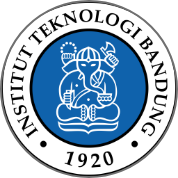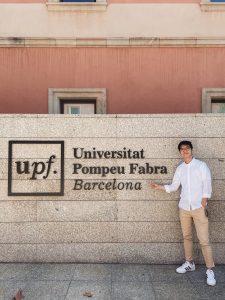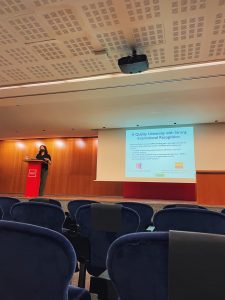Undergraduate Program in Mathematics
- About
- Curriculum Structure
- Courses
- Learning Outcome
- Minor
- Study Guide
- Academic Regulation
- Student Mobility
The undergraduate program in Mathematics (hereafer called UPM) provides learning process in mathematics and related fields. The UPM gives students strong fundamental mathematical knowledge, that allows them to pursue a higher degree or to work in various fields.Aside from formulating and exploring new fundamental theoretical knowledge, the study of Mathematics also focuses on quantifying a problem (from everyday life) as a mathematical model and then finding a solution to the model. In pursuing a degree at the Mathematics Study Program, students are trained with the skill of mathematical modelling in solving everyday problem. Equipped with strong fundamental Mathematical knowledge, students are able to generalize and extrapolate the Mathematical model of natural and social phenomenon from the simplest case to a more sophisticated model of a complicated problem. One example is a traffic congestion problem encountered in big cities. This problem may be formulated into a mathematical model, where an optimal solution may be deduced.The faculty members who teach at the UPM are grouped into five research divisions, namely Analysis and Geometry, Algebra, Combinatorial Mathematics, Financial and Industrial Mathematics, and Statistics. Students are given options to choose elective courses and topics for their “Skripsi” (final projects) in many areas of applications of mathematics and statistics, including actuarial science.
Thus, it is not true that a Mathematics graduate will end up only as a Mathematics teacher. The fact is that many Mathematics graduates work successfully in various fields other than education, such as industries, manufactures, finance and banking, and information technology.
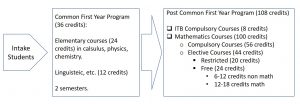 At least 144 credits are required to complete the UPM. The curriculum was designed to have 4
orientation stages: Common First Year Stage, Object-oriented Stage, Property-oriented Stage, and
Maturation Stage. Each of them is explained in detail in Section 3. Compulsory and elective courses
offered by UPM are :
At least 144 credits are required to complete the UPM. The curriculum was designed to have 4
orientation stages: Common First Year Stage, Object-oriented Stage, Property-oriented Stage, and
Maturation Stage. Each of them is explained in detail in Section 3. Compulsory and elective courses
offered by UPM are :
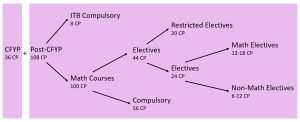 Elective courses
Elective courses
It is our belief that one pursues the study of mathematics with objectives: as a science and as a tool for other fields. Mathematics is an intrinsic component of science, part of its fabric, its universal language and indispensable source of intellectual tools. Reciprocally, science inspires and stimulates mathematics, posing new questions, engendering new ways of thinking, and ultimately conditioning the value system of mathematics. Therefore, we encourage our students to take between 6 and 12 credits from courses offered by other study programmes. Thus, our students are able to mingle or interacts with nonmathematics students and familiar themselves with subjects other than mathematics.
We acknowledge the wide range in interests and needs by incorporating flexibility in the curriculum. The UPM offers plenty elective courses. After completing Common First Year Program (TPB), students have to complete at least 108 credits consisting of 8 credits from ITB compulsory courses and 100 credits from mathematics and mathematics-related courses. Almost half out of these 100 credits are from elective courses. There are two kinds of elective courses, Semi-restricted Electives (24 credits) and Restricted Electives (20 credits). One benefits of such flexibility is that students can design their study by selecting elective courses that meet their interests, talents, and needs.
Restricted Elective Courses.UPM students are required to take 20 credit points from Restricted Elective Courses. Each student has to take at least one course (4 credits each) from each of the following five groups of courses:
- (Algebra) MA3021 Algebraic Structures or MA3022 Linear Algebra,
- (Geometry) MA3041 Introduction to Differential Geometry or MA3042 Geometry
- (Probability and Statistics) MA3281 Mathematical Statistics or MA4181 Introduction to Stochastic Processes.
- (Network) MA3051 Introduction to Graph Theory or MA4151 Cryptography or MA4251 Coding Theory.
- (Optimization) MA3071 Introduction to Optimization or MA3072 Partial Differential Equations.
Semi-restricted Elective Courses.
Students must pass at least 12 credit points from courses offered by the UPM (minimum 8 credits from fourth year courses), and at least 6 credit points from other study programs (minimum 4 credits from third or fourth year courses). For UPM students participating in minor program, they must pass 12-18 credits offered by the selected study program.
| No | Code | Course Name | CP |
| Semester I | |||
| 1 | MA1101 | Mathematics IA | 4 |
| 2 | FI1101 | Elementary Physics IA | 4(1) |
| 3 | KI1101 | General Chemistry IA | 3(1) |
| 4 | KU1011 | Indonesian Language: Scientific Writing | 2 |
| 5 | KU1160 | Introduction to Mathematics and Natural Sciences | 2 |
| 6 | KU1102 | Introduction to Computation | 3 |
| Total | 18 | ||
| Semester II | |||
| 1 | MA1201 | Mathematics IIA | 4 |
| 2 | FI1201 | Elementary Physics IIA | 4(1) |
| 3 | KI1201 | General Chemistry IIA | 3(1) |
| 4 | KU1202 | Introduction to Engineering and Design | 3 |
| 5 | KU1024 | English | 2 |
| 6 | KU1001 | Sports | 2 |
| Total | 18 | ||
| Semester III | |||
| 1 | MA2111 | Fundamental Mathematics | 2 |
| 2 | MA2121 | Elementary Linear Algebra | 4 |
| 3 | MA2151 | Simulation and Computational Mathematics | 4 |
| 4 | MA2181 | Data Analysis | 4 |
| Elective courses/ ITB Compulsory courses | 4 | ||
| Total | 18 | ||
| Semester IV | |||
| 1 | MA2231 | Multivariable Calculus | 4 |
| 2 | MA2271 | Introduction to Differential Equation | 4 |
| 3 | MA2251 | Discrete Mathematics | 4 |
| Elective courses/ ITB Compulsory courses | 6 | ||
| Total | 18 | ||
| Semester V | |||
| 1 | MA3131 | Introduction to Complex Analysis | 4 |
| 2 | MA3171 | Numerical Mathematics | 4 |
| 3 | MA3181 | Probability Theory | 4 |
| Elective courses/ ITB Compulsory courses | 6 | ||
| Total | 18 | ||
| Semester VI | |||
| 1 | MA3231 | Introduction to Real Analysis | 4 |
| 2 | MA3011 | Career in Mathematics | 2 |
| 3 | MA3271 | Mathematical Modeling | 4 |
| Elective courses/ ITB Compulsory courses | 6 | ||
| Total | 18 | ||
| Semester VII | |||
| 1 | MA4093 | Final Project I | 3 |
| 2 | MA4091 | Mathematics Seminar I | 1 |
| Elective courses | 14 | ||
| Total | 18 | ||
| Semester VIII | |||
| 1 | MA4094 | Final Project II | 3 |
| 2 | MA4092 | Mathematics Seminar II | 1 |
| Elective courses | 14 | ||
| Total | 18 | ||
| No | Code | Course Name | CP |
| 1 | MA2011 | Topics in Math Perspectives | 2 |
| 2 | MA2022 | Structure of Integers | 3 |
| 3 | MA2075 | Introduction to Mathematical Modelling | 2 |
| 4 | MA2252 | Introduction to Number Theory | 4 |
| 5 | MA2281 | Non-Parametric Statistics | 2 |
| No | Code | Course Name | CP |
| 1 | MA3021 | Algebraic Structures | 4 |
| 2 | MA3022 | Linear Algebra | 4 |
| 3 | MA3023 | Numerical Linear Algebra | 3 |
| 4 | MA3032 | Fourier and Wavelet Method | 3 |
| 5 | MA3041 | Introduction to Differential Geometry | 4 |
| 6 | MA3042 | Geometry | 4 |
| 7 | MA3051 | Introduction to Graph Theory | 4 |
| 8 | MA3052 | Algorithmic Graph Theory | 3 |
| 9 | MA3053 | Machine Learning | 3 |
| 10 | MA3071 | Introduction to Optimization | 4 |
| 11 | MA3073 | Partial Differential Equations | 4 |
| 12 | MA3161 | Introduction to Theory of Interest | 3 |
| 13 | MA3182 | Analysis of Variance and Regression | 2 |
| 14 | MA3261 | Introduction of Financial Mathematics | 4 |
| 15 | MA3272 | Optimization Methods | 4 |
| 16 | MA3281 | Mathematical Statistics | 4 |
| No | Code | Course Name | CP |
| 1 | MA4031 | Real Function | 4 |
| 2 | MA4071 | Introduction to Dynamical System | 4 |
| 3 | MA4072 | Deep Learning | 4 |
| 4 | MA4095 | Internship | 2 |
| 5 | MA4151 | Cryptography | 4 |
| 6 | MA4171 | Linear Control Theory | 4 |
| 7 | MA4181 | Introduction to Stochastic Processes | 4 |
| 8 | MA4251 | Coding Theory | 4 |
| 9 | MA4281 | Multivariate Analysis | 4 |
| No | Code | Course Name | CP |
| 1 | MA4041 | Capita Selecta in Geometry | 4 |
| 2 | MA4121 | Capita Selecta in Algebra I | 4 |
| 3 | MA4172 | Capita Selecta in Industrial and Financial Mathematics I | 4 |
| 4 | MA4151 | Capita Selecta in Discrete Mathematics I | 4 |
| 5 | MA4182 | Capita Selecta in Statistics I | 4 |
| 6 | MA4032 | Capita Selecta in Analysis | 4 |
| 7 | MA4221 | Capita Selecta in Algebra II | 4 |
| 8 | MA4272 | Capita Selecta in Industrial and Financial Mathematics II | 4 |
| 9 | MA4252 | Capita Selecta in Discrete Mathematics II | 4 |
| 10 | MA4282 | Capita Selecta in Statistics II | 4 |
-
Graduates become intelligent scholars who serve as role models in their community and give a significant contribution to the implementation of the society’s ideal, which is a prosperous and noble life.
-
Graduates have comprehensive mastery of knowledge, equipped with extensive insights and awareness of the usefulness of their knowledge hence have the ability and instinct for its development and/or implementation, both independently and in collaborations, including inter-disciplinary cooperation.
-
The students are able to exhibit sufficient knowledge and insight in mathematics and relevant areas, with a relatively deep understanding in some particular sub fields of mathematics, and apply them to solve problems,
-
The students are able to demonstrate adequate basic math skills, such as observing, recognizing, collecting and utilizing data; to make calculation, estimation, and interpretation, with or without the aid of technologies (such as computers and software),
-
The students are able to exhibit mathematical powers, that include reasoning, making connections, solving problems, and communicating,
-
The students are able to show the ability to complete tasks and to develop relatively new ideas, both independently and in team including preparing and presenting reports, orally and in writing,
-
The students have personality characteristics and habits of work necessary for successful career, and understand professional and ethical responsibility,
-
The students are aware of contemporary issues and able to respond appropriately,
-
The students are well-prepared for self-development, in mathematics and relevant areas, or career in work.
| No | Code | Course Name | CP |
| 1 | MA2121 | Elementary Linear Algebra | 4 |
| 2 | MA2231 | Multivariable Calculus | 4 |
| 3A | MA2181 | Data Analysis | 4 |
| 3B | MA2281 | Non-parametric Statistics | 2 |
| 3C | MA2271 | Introduction to Differential Equations | 4 |
| 3D | MA2251 | Discrete Mathematics | 4 |
| 4A | MA3231 | Introduction to Real Analysis | 4 |
| 4B | MA3022 | Linear Algebra | 4 |
| 4C | MA3021 | Algebraic Structures | 4 |
| 5 | MA3xxx/MA4xxx | Other mathematics courses | |
| Total | 12-18 | ||
 Loading...
Loading...
 Loading...
Loading...
The Undergraduate Programme in Mathematics (UPM) ITB students are encouraged to participate in student mobility programs. Information of the programs offered by ITB is available in student mobility programs.
Since 2021, the Indonesia Ministry of Education and Culture organizes IISMA (Indonesian International Student Mobility Awards). Information of IISMA is available in other semester mobility programs or kampus merdeka page. The UPM student participating in IISMA 2021 is Daniel Rivaldo Gunawan (ID 10118073) .
For local and international students who want to study at Mathematics Study Program, the information can be found in admission page.

